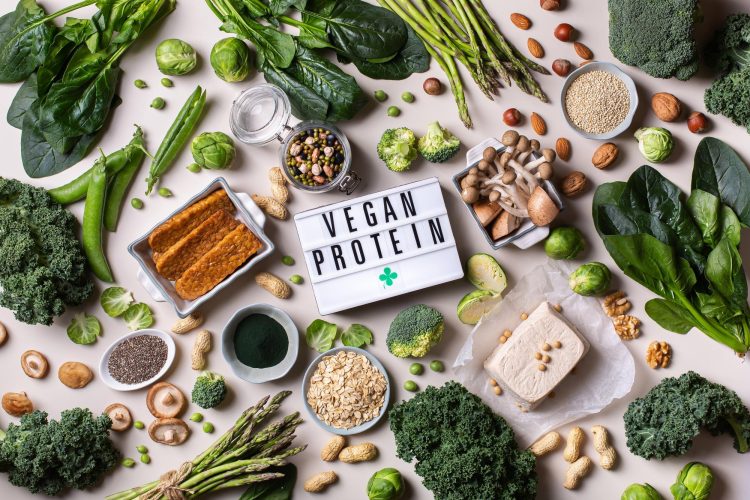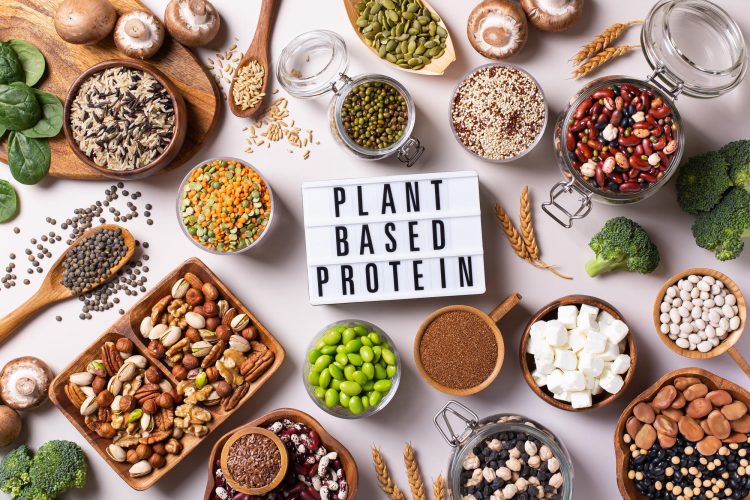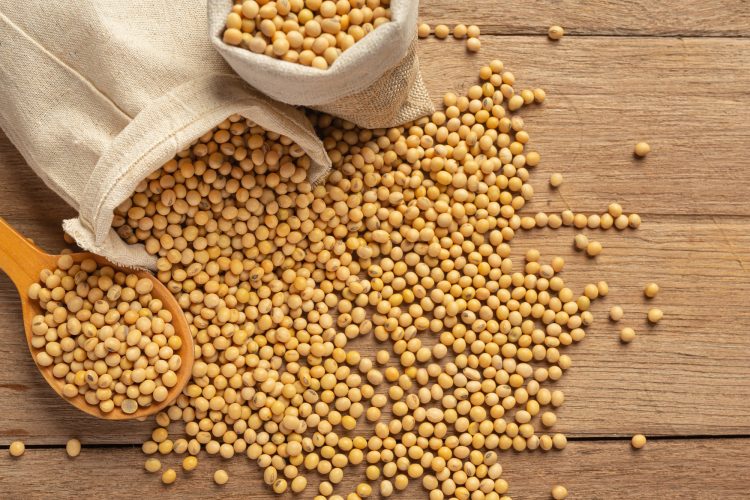Whey protein is the most popular recovery supplement. Chances are you, too, down a whey protein shake right after a training session to maximize hypertrophy and strength gains. However, did you know that 65–75% of the world’s population is lactose intolerant or has a reduced ability to digest lactose? (1)
The rise of plant-based protein powders reflects the growing popularity of veganism, driven by health, ethical, and allergy-related concerns. The great news is that switching from whey to plant-based protein is rather seamless, with no negative effects on your muscle-building goals.
In this article, I take you over everything you need to know to transition from animal-based protein powders to vegan substitutes, including the different types, their benefits, choosing the right supplement, and tips for adding them to your diet.
Different Plant-Based Protein For Allergy-Friendly Muscle Gain
While milk allergies can be a real bummer, that doesn’t mean you cannot continue your muscle-building journey. Plant-based protein powders are well-tolerated by most people. Here are the best plant-based protein powder options you can explore:
Pea Protein
This is one of the most popular vegan protein options. It is easy on the stomach and blends well in water or juice. Pea protein also has a decent amino acid profile. However, it can have a gritty texture and an earthy taste.
A review published in Clinical Reviews in Allergy & Immunology concluded that a pea protein isolate was well-tolerated by most people with food allergies to milk, fish, egg, wheat, peanut, and tree nuts. (2)
Hemp Protein
It is a nutty, earthy, plant-based protein source that has a good quantity of healthy fats and fibers. Hemp is a complete protein, meaning it has all nine essential amino acids. That said, it has a lower protein percentage than other options.
Soy Protein
It is another complete plant-based complete protein. Soy protein isolate is considered one of the best plant-based protein sources. This is a staple in most vegan diets in one form or another because of its versatility and neutral flavor.
That said, soy is a common allergen, and some people can have difficulty digesting it, especially when consumed in larger quantities.
Rice Protein
Brown rice protein is one of the most accessible food sources. Since rice and peas are incomplete proteins, they are often mixed together, or with soy, hemp, and other plant-based sources to balance their nutritional profile. This protein powder has a mild flavor, making it suitable for different recipes.
“The current science shows that if you eat a lot of healthy whole plant-based foods, your body can get all the protein it needs,” said Dr. Layne Norton (Ph.D. in Nutritional Sciences).
Understanding Complete Proteins and Amino Acids For Plant-Based Proteins

Some people assume that animal food sources are inherently better than plant sources. However, your body has no clue if something is coming from a cow or a pea. The growth and recovery ultimately boil down to amino acids.
You need complete proteins to get the best bang for your buck. Complete protein contains all nine essential amino acids that your body cannot produce on its own.
While most animal products are complete proteins, that is not the case with plant-based sources.
Here is how to choose the plant-based proteins:
- Mix and Match: Since most plant-based powders are incomplete protein sources, you must pick a product with different food sources. For instance, rice and peas together create a complete protein profile.
- Plant Powerhouses: The problem with blends is that your chances of encountering a trouble ingredient shoot through the roof. If you’re looking for a single-ingredient product, opt for soy, quinoa, and hemp protein powders, as they are complete protein sources.
Benefits of Plant-Based Protein
Here are the advantages of switching to plant-based proteins:
Build Muscles and Strength
Plant-based supps can produce the same hypertrophic and strength gain results as whey protein powders.
A study published in the Sports (Basel) journal found that whey and pea protein produce similar outcomes in measurements of body composition, muscle thickness, force production, performance, and strength following eight weeks of high-intensity functional training. (4)
Better Digestion
Whey can cause bloating, gas, or diarrhea in people who are lactose intolerant or have other milk allergies. Most plant-based proteins are more bioavailable, and certain supps come with added digestive enzymes that can make them kinder on your stomach.
Nutrient Boost
Most vegan proteins are packed with micronutrients like vitamins, minerals, and fibers, which can boost your overall health and well-being. Most animal-based supplements lack these perks.
Longevity
Individuals who eat a higher amount of plant-based protein tend to live longer and have a lower risk of heart disease and cancer.
However, Dr. Norton clarifies that this is not necessarily because of eating plant-based foods but because vegans generally eat fewer calories and more fiber.
Sustainability
Plant-based protein production usually has a smaller environmental footprint than animal-based sources. Environmental sustainability is a big consideration for vegans, so most vegan products usually mention their carbon footprint or other such variables on their packaging.
Building Muscles on Plant-Based Protein Powders: Myths or True?
When you imagine a jacked bodybuilder, you probably picture a person gulping whey protein shakes. Most serious bodybuilders cringe at the idea of going plant-based, thinking they will lose all their gains. However, this is far from the truth.
In this section, we go over the three most common myths about vegan protein powders:
Plant Proteins Are Incomplete and Are Not Effective For Promoting Hypertrophy
While it is true that most plant-based ingredients are incomplete protein sources, you’ll rarely see single-ingredient rice or peas protein powders. Most vegan supplements contain multiple ingredients to ensure a complete amino acid profile.
A study published in the Nutrients journal found that plant-based protein supplementation significantly increased skeletal muscle mass and strength compared to no supplementation. The effect was more significant in people already engaged in resistance training. (3)
Soy Protein is Bad For You
In contrast to the popular opinion, high-quality soy is an excellent source of protein that causes little to no digestive issues. That said, each individual might react uniquely to different foods, and you must learn to listen to your body to ensure optimal results.
You Must Eat More Plant Protein To See Results
There might be some truth to this statement. Plant proteins can be slightly less digestible than animal proteins. However, the difference is minimal and won’t be noticed by most people.
Bodybuilders who experience a slight muscle loss after switching to a vegan diet can compensate for it by slightly bumping up their daily intake.
“It is more challenging to get enough protein from plant sources than animal sources,” Norton said. “This is because plant-based protein sources are generally lower in bioavailable protein and essential amino acids.” (5)
Norton recommends strategically choosing plant-based protein powders that are high in certain amino acids to boost recovery and growth.
“One gram of protein per pound of body weight is a good starting point,” said Dr. Mike Israetel (Ph.D. in Exercise Science and former Prof. of Nutrition and Sports Science). “Very overweight people can benefit from this recommendation because it makes them feel full and reduces overall calorie intake.”
Check Out: 12 Vegan Bodybuilders That Will Motivate You To Go Plant-Based
Choosing the Right Plant-Based Protein Powder for You
Here is how to choose a suitable vegan protein for yourself:
- Check the Protein Content: Each serving of the supp should offer at least 20 grams of protein. Otherwise, you’ll have to take multiple servings daily to meet your daily recommended intake.
- Inspect For Fillers: Have an eye out for maltodextrin and artificial sweeteners on the ingredient list. They are just added to spike the protein volume and offer no benefits. Furthermore, they can harm your gut microbiome.
- Watch For Added Sugars: Most plant-based protein powders have a very nutty flavor. Some companies use a boatload of added sugar to neutralize it.
Other Deciding Factors While Picking a Plant-Based Protein Powder
Keep these in mind while settling on a vegan protein:
- Taste: You are in for a surprise if you’ve never tried a plant-based protein. The taste, texture, and after-taste vary greatly from whey proteins. Most people usually try multiple products before they can settle on one.
- Dietary Restrictions: Vegans must pick a complete protein supp, whereas people who are just seeking a dairy-free option can settle on the one that they like the best without worrying too much about their amino acid profile.
- Goals: Bodybuilders must get a plant-based protein powder that has all the nine essential amino acids to ensure maximum results.
Examining Allergy Concerns With Whey Protein Powders
Whey is derived from milk, which can cause allergies and uncomfortable symptoms for many people. These symptoms can ruin your workouts and sabotage your goals. Here are the main issues with whey protein:
Lactose Intolerance
This is arguably the most common issue with milk. It happens when the body cannot break down lactose, the sugar in milk, resulting in gas, bloating, cramps, and diarrhea. The severity of the symptoms can vary for each individual.
Dairy Sensitivities
Many people confuse lactose intolerance with dairy sensitivities. If you have dairy sensitivity, your immune system will see milk proteins as enemy objects and trigger various reactions to fight them. This can cause milk discomfort or a massive allergic reaction.
How Common Are Lactose Intolerance and Dairy Sensitivity? (Steps To Test)
Most underestimate the prevalence of milk allergies, with many people going undiagnosed or misattributing their issues to something else. Nutrition experts believe that the numbers for dairy sensitivities are even higher than those for lactose intolerance.
So, how do you know if you have milk allergies?
The most common milk allergy symptoms include:
- Digestive Distress: If milk consumption is causing you digestive distress instead of giving you the energy to crush a workout, you might be allergic to milk. Also, persistent discomfort can be a sign of a severe allergy.
- Skin Issues: Hives, rashes, and itchiness are other common symptoms associated with whey allergies.
- Respiratory Trouble: Wheezing, coughing, or tightness in the chest are also signs of whey protein allergies.
Contrary to what most people think, food allergies are not permanent. You might have a certain food allergy at one point and also develop a new allergy after a few months.
If you can relate to any one of the issues listed above, I highly recommend you see a doctor and get tested for any food allergies. As a veteran personal trainer, I have seen firsthand the transformative power of eliminating trouble-causing foods from your nutrition plan.
Conclusion
Most people never try plant-based protein powders because they think vegan sources are not as powerful as animal sources. However, evidence has shown that plant-based protein powders can be as effective for building strength and muscle as whey supps.
You must, however, adjust your daily intake to account for vegan protein’s lower digestibility. Also, ensure that you are opting for a complete protein to ensure optimal results. Remember, you don’t have to switch to a vegan diet to try plant-based proteins.
Try transitioning to the vegan supps and notice if you see any favorable changes. You can make the lifestyle-altering decision later.
If you have any questions about plant-based protein powders, drop them in the comments below, and I’ll be happy to help!
References
- National Institute of Diabetes and Digestive and Kidney Diseases (NIDDK). Lactose Intolerance. National Institutes of Health. https://www.niddk.nih.gov/health-information/digestive-diseases/lactose-intolerance/
- Ho, M. H., Wong, W. H., & Chang, C. (2014). Clinical spectrum of food allergies: a comprehensive review. Clinical reviews in allergy & immunology, 46(3), 225–240. https://doi.org/10.1007/s12016-012-8339-6
- Stoodley IL, Williams LM, Wood LG. Effects of Plant-Based Protein Interventions, with and without an Exercise Component, on Body Composition, Strength and Physical Function in Older Adults: A Systematic Review and Meta-Analysis of Randomized Controlled Trials. Nutrients. 2023;15(18):4060. Published 2023 Sep 19. doi:10.3390/nu15184060
- Banaszek A, Townsend JR, Bender D, Vantrease WC, Marshall AC, Johnson KD. The Effects of Whey vs. Pea Protein on Physical Adaptations Following 8-Weeks of High-Intensity Functional Training (HIFT): A Pilot Study. Sports (Basel). 2019;7(1):12. Published 2019 Jan 4. doi:10.3390/sports7010012
- Pinckaers, P. J. M., Trommelen, J., Snijders, T., & van Loon, L. J. C. (2021). The Anabolic Response to Plant-Based Protein Ingestion. Sports medicine (Auckland, N.Z.), 51(Suppl 1), 59–74. https://doi.org/10.1007/s40279-021-01540-8
Tip: If you're signed in to Google, tap Follow.













